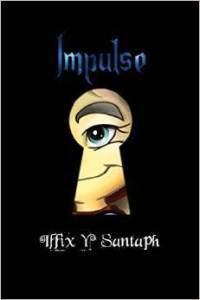Iffix Y. Santaph's Blog, page 4
June 15, 2015
The Pen Is Mightier Than the Keyboard…

Writing Rough Drafts by Hand
As you are in the process of writing a story’s more complicated scenes, you may find it advantageous to write your first draft the old-fashioned way. Why would someone do this, in the information age, when it is so easy to find information and share information?
Perhaps that alone is a reason in itself. Sometimes, when we are challenged to write a difficult scene, particularly a scene that takes us out of our comfort zone–we still have one, even if we strive to hide it from our audience–the allure of distractions can halt progress significantly.
On the other hand, the very fact that it may take longer to put pen to paper might be advantageous.Over my twenty years as a writer, I have seen a tremendous benefit to scribbling as a way to establish a free flow of thought. I have kept many journals, and I still do so, in spite of my tremendous affection for my laptop. (Seriously, those who know this writer best are fully aware that prying my keyboard from my fingers can be as dangerous as taking food from a crocodile’s mouth.)
There is, of course, no arguing that the human mind is infinitely superior to a computer. Even a keyboard can slow down the process of sharing information. But, when it comes to writing in a winsome manner, there is something to be said for the slow, gradual, reflective process of hand-written work. Over five millenniums of storytellers and poets have benefited from a slow, deliberate approach. Isn’t it worth considering what this approach can do for you?
You may have heard stories of brilliant writers who wrote a rough draft on a series of napkins or post-its. These writers are not crazed. They’ve simply seen the benefit of slowing down. And what’s the worst that can happen? A bit of ink on your face when you clear that ketchup smear with the wrong napkin?
Besides, this way, knowing full well that you may have written something ghastly, you can easily crumple it up or burn it and not feel the lazy inclination to keep words in your story simply because they are already there.
Food for thought: what other advantages come from writing your first draft by hand?


June 8, 2015
Two Faces
When a character displays traits that make them hypocritical, deceitful, treacherous, we might even say evil, we use the term “two-faced”. Interestingly, the expression “two-faced” is based on a greek deity Janus (from which we get the name for the month of January), who was known for having two faces, one which peered forward, one which peered backward.

Every character, then, ought to be “two-faced”. Only by understanding where a character has been can we understand where the character is going. In other words, rather than boldly attempting to make our personal story a battle of good and evil, make it a story of opposed intentions and motivations. In this way, your audience will be drawn in by characters they truly understand. Who knows, they may even pick a hero to despise or a villain to cheer for, but they will enjoy the story.
We need to understand here that a villain need not always be nefarious, nor a hero be a constant force for good. A wide subsection of fiction is based on antiheroes. The effort taken to craft an antihero is actually the same effort that should be used to develop all heroes and villains. Consider: an antihero is someone who has genuine motives behind his actions. We can generally relate to an antihero more easily than a villain or hero. Han Solo speaks to a wider audience than Yoda or Emperor Palpatine. Tony Stark, in spite of his wealth, is a more relatable character to most than Captain America or Ultron. Why is this? The human race is filled with flawed people, most of which have good intentions.
Let’s rephrase that statement more simply: The actions of people are based on motivations and intentions. (Good and heroic, or bad and villainous, motivations and intentions are the key.) Let’s then, compare two words: Intention and Motivation.
Intention: An Aim or Plan. (Looking ahead.)
Motivation: The reason for acting and behaving a specific way. (Looking back.)
Every character should have clear intentions and clear motivations.
Mysteries are based on the study of motivation. The protagonist–in this case, the detective–intends to discern a motive from the antagonist–the criminal–and works toward this aim in a variety of ways. Once the motive is established, he can give the motive a face, an identity.
When we develop a story, we decide on the protagonist and the antagonist. But if we really contemplate these roles, they represent characters who are opposed to one another. But (here’s where the matter gets interesting) the protagonist need not be a hero, nor is the antagonist required to be a villain. These are simply characters whose objectives are opposed. Really, the best villain is one whose motivations lead him in a course opposed to the hero, not simply someone doing evil for evil’s sake. And, that being said, the villain may display traits that may be heroic and altruistic, but for the opposing side. If your villain is, by all attributes, someone to cheer for, your audience won’t know what to expect, but they’ll stick with you every step of the way until they find out.
Now, because I firmly believe that authors have the responsibility to teach and learn from one another, to build the best stories possible, I invite you to share your thoughts on the following questions: how do motivations and intentions lead to more profound characters? How can writers better demonstrate deeply motivated characters? Which sorts of conflict have arisen from this in your personal storytelling projects?
About the author: Iffix Y Santaph is the author of the YA science-fantasy series Forgotten Princess. It is his intention to build a world full of well-rounded, deeply motivated characters. The first book of this series Impulse is available now from a variety of online retailers, including Amazon.com.


June 5, 2015
Finding Heart
Your Character’s Voice
Establishing a voice in fiction can be a challenge. Not only do you need to find your own voice as narrator, but you will also need to consider how any character would say what you need him or her to say. How can you learn about your character and work to improve your dialogue?
Some have tried to represent the change in character voice by spelling dialogue differently from traditional prose. Not that it’s a bad idea, but if you’re going to be using that character’s dialogue frequently, you don’t really want your reader to struggle to make sense of what you wrote. It’s another matter when you’re writing actual words that they can look up in a dictionary. But if you’re writing gibberish, “because that’s how he’d say it” you’ll lose a large portion of your audience. Aside from this, you need to know your character more deeply than his pronunciation of certain words.
If you build your character well, the dialogue will always fit who she is as a person. An ancient proverb states that, “Whatever is in the heart overflows into speech.” (Luke 6:45, The Living Bible) So if your character is going to speak, you need to give him a heart. What does that mean? What if the character is a robot programmed to speak?
A heart in this case isn’t something that beats inside your character’s chest. It’s his motivation, his wants, his desires, his reason for living. (Even L. Frank Baum’s Tin Man proved that he had a heart.) Every character has a heart. Without a heart, there is no story. Ask yourself: “What does my character want out of life? What does he care about? What is he willing to do to succeed?” Unless you have an answer, your character will be flat. A story can only be meaningful when the characters have heart.
Your audience should have some anticipation about how your character will react as the scene unfolds. And if the character’s expressions agree with the audience’s expectations, the audience is generally satisfied. Not that your character cannot surprise the reader. But if he does so, there must be a hidden reason, something that speaks from deep inside your character. In this case, his heart simply goes another direction.
Do you really know your character’s heart? Based on what you know does his dialogue ring true? As an exercise, try to read one of your heavy-dialogue scenes while skipping the speaker tags. Can you figure out who said what? If not, perhaps this bears a bit more consideration.
Having trouble getting to know your character deeply? Try writing your next planned scene in first person from your character’s point of view. (If you’re already writing in first person, choose another character from the scene.) Though this takes a bit of effort to get used to, if you do it right, your insights into your character will be tremendous. Remember that this character too needs to have a life. She doesn’t simply exist for the sake of the story. If she does, she will be two-dimensional. And it’s very hard for a two-dimensional character to escape the printed page. A lot of what she will observe through your prose, how she will personally react and why, will give a better understanding about who she is.
Some time ago, I challenged myself to write an entire novel from the viewpoints of multiple characters in first person. Just about every character in that novel had written a portion of the story, excluding one who was in fact later determined to be illiterate due to her background. Because I took on this challenge, I had a better grasp of what my characters’ inner feelings were when it came time to write about them in traditional 3rd person. You needn’t be so extreme, naturally. But if you should choose to write this way, you may very well find you like the result.
We often write dialogue to give key details about our plot. But the best dialogue tells as much about the character as it does about the scene. Put forth an effort to understand who your characters are and your dialogue will ring true. Characters with heart can reach your audience’s heart and remain there forever.


FINDING HEART
Your Character’s Voice
Establishing a voice in fiction can be a challenge. Not only do you need to find your own voice as narrator, but you will also need to consider how any character would say what you need him or her to say. How can you learn about your character and work to improve your dialogue?
Some have tried to represent the change in character voice by spelling dialogue differently from traditional prose. Not that it’s a bad idea, but if you’re going to be using that character’s dialogue frequently, you don’t really want your reader to struggle to make sense of what you wrote. It’s another matter when you’re writing actual words that they can look up in a dictionary. But if you’re writing gibberish, “because that’s how he’d say it” you’ll lose a large portion of your audience. Aside from this, you need to know your character more deeply than his pronunciation of certain words.
If you build your character well, the dialogue will always fit who she is as a person. An ancient proverb states that, “Whatever is in the heart overflows into speech.” (Luke 6:45, The Living Bible) So if your character is going to speak, you need to give him a heart. What does that mean? What if the character is a robot programmed to speak?
A heart in this case isn’t something that beats inside your character’s chest. It’s his motivation, his wants, his desires, his reason for living. (Even L. Frank Baum’s Tin Man proved that he had a heart.) Every character has a heart. Without a heart, there is no story. Ask yourself: “What does my character want out of life? What does he care about? What is he willing to do to succeed?” Unless you have an answer, your character will be flat. A story can only be meaningful when the characters have heart.
Your audience should have some anticipation about how your character will react as the scene unfolds. And if the character’s expressions agree with the audience’s expectations, the audience is generally satisfied. Not that your character cannot surprise the reader. But if he does so, there must be a hidden reason, something that speaks from deep inside your character. In this case, his heart simply goes another direction.
Do you really know your character’s heart? Based on what you know does his dialogue ring true? As an exercise, try to read one of your heavy-dialogue scenes while skipping the speaker tags. Can you figure out who said what? If not, perhaps this bears a bit more consideration.
Having trouble getting to know your character deeply? Try writing your next planned scene in first person from your character’s point of view. (If you’re already writing in first person, choose another character from the scene.) Though this takes a bit of effort to get used to, if you do it right, your insights into your character will be tremendous. Remember that this character too needs to have a life. She doesn’t simply exist for the sake of the story. If she does, she will be two-dimensional. And it’s very hard for a two-dimensional character to escape the printed page. A lot of what she will observe through your prose, how she will personally react and why, will give a better understanding about who she is.
Some time ago, I challenged myself to write an entire novel from the viewpoints of multiple characters in first person. Just about every character in that novel had written a portion of the story, excluding one who was in fact later determined to be illiterate due to her background. Because I took on this challenge, I had a better grasp of what my characters’ inner feelings were when it came time to write about them in traditional 3rd person. You needn’t be so extreme, naturally. But if you should choose to write this way, you may very well find you like the result.
We often write dialogue to give key details about our plot. But the best dialogue tells as much about the character as it does about the scene. Put forth an effort to understand who your characters are and your dialogue will ring true. Characters with heart can reach your audience’s heart and remain there forever.


Small Word vs Right Word
Writing for Middle-Grade
Many writers assume that because they are writing for a young audience they must write down, simplify their word choices, and make their writing easier to read. As I frequently spend a lot of time reading books for middle-graders to compare the genre, I see a lot of this sort of thing. There are some writers who stand out in a good way, for not “dumbing down” their writing, and these have books as New York Times best sellers partly due to this. Many children are drawn to the mental exercise of reading slightly above their grade level.
Unless you are required to teach children how to read, in which case you should really be in a classroom instead of behind a desk writing a book, assume that your reader already knows how. He is picking up your story to learn something new. This doesn’t require you to write to fifth graders at a 12th grade reading level. But choose the right word for the right occasion. Don’t choose easier words than you would have written otherwise for the sake of young readers.
Some conventions are absolutely necessary when writing for a young audience, and these usually have to deal with plot and characterization rather than word choice. When writing for young ones, limit anything that wouldn’t be found in a PG movie at the theatre. This means no blood and guts, no foul language, and no sex. (Interestingly, foul language is a characterization problem, not simply a matter of word choice. If you are writing a middle-grade story featuring a character that would use that sort of language, it’s likely time to revise your character.)
 When I was in grade school, we did an exercise that had to deal with synonyms and ranks. Children do actually understand synonyms and why they are used. Our teacher had us list all the words we could think of at the time for “big”, words like “large”, “huge”, “gigantic”, “enormous”. Then we would rank those words according to how we imagined their sizes to differ.
When I was in grade school, we did an exercise that had to deal with synonyms and ranks. Children do actually understand synonyms and why they are used. Our teacher had us list all the words we could think of at the time for “big”, words like “large”, “huge”, “gigantic”, “enormous”. Then we would rank those words according to how we imagined their sizes to differ.
Now, put this to work for you. Compare “big city” vs “sprawling metropolis”. They mean essentially the same thing. But the reader gets a different picture, in fact, a clearer one, when reading the second phrase.
Does that mean we’ll never use “big” in our Fiction? I can just imagine those folks living in the Big Apple (New York City) about to throw a fit. And as anyone in the United States knows “everything’s bigger in Texas”. Did you notice how that last statement was in quotes? Here’s an interesting twist. When you are developing a character’s speaking patterns, you’ll want to make dialogue especially ring true. That means if your character would say “big city”, then that is how you’ll write their dialogue. In so doing, you are still putting the key concept of this article into practice: the right word for the right occasion.
You will also want to be cautious of taking the other extreme, choosing big words just because they sound impressive, which many would likely deem floccinaucinihilipilification. A true indication that you have developed a degree of skill as a writer will be when you no longer have to slave to find the right word for the occasion. I know as I was starting out, I would frequently use my thesaurus. At that point, to me the higher the number of syllables the word had, the more likely I was to use it, regardless of meaning. That was a very detrimental practice, especially when the word meant something very different than I thought it did. I learned a lesson from that, and this sort of problem can be easily remedied. When we cannot decide on which word to use, a good dictionary will be very specific and will give examples.
If you are reading this article, you already have a dictionary at your finger-tips, as Google’s own definition tool is very useful in this regard. You can access this tool by writing any word into Google’s search bar, followed by the word “definition”. This can be a very effective tool while honing your writing craft.
If you make it a practice to choose the right words for the right occasions, not only will your audience flock to your books when they are young, but many will return to your stories to read again for the nostalgia of a good book when they are older. And having an audience who will choose to read your book twice is definitely a sign of solidly good writing.


June 2, 2015
Fired!

Gavyn charged through the corridors of the castle, his bare clawed feet slipping across the golden tiles. He managed to keep his balance, without losing his grip on the comatose young woman. He ran through the castle doors and out into the streets of Aerelon. The lantern light quickly faded into the darkness. The scarabs chased after him untiringly. An NME General flew in behind them taking aim at Gavyn with its blaster arm.
Rounding the corner into the market, Gavyn kicked over a pyramid of wine barrels, hoping to slow down the robots. But as the scarabs slowed down, the general found the opening he was looking for. Instinctively, Gavyn tossed the maiden high into the air, and barrel-rolled out of the line of fire. He dove back and caught her in his arms just in time. He glanced back at the general, knowing it had a clear line of fire.
To be continued...
This brief excerpt is from Iffix Y Santaph's Impulse, available now at Amazon.com and various online retailers.
Fired!
Gavyn charged through the corridors of the castle, his bare clawed feet slipping across the golden tiles. He managed to keep his balance, without losing his grip on the comatose young woman. He ran through the castle doors and out into the streets of Aerelon. The lantern light quickly faded into the darkness. The scarabs chased after him untiringly. An NME General flew in behind them taking aim at Gavyn with its blaster arm.
Rounding the corner into the market, Gavyn kicked over a pyramid of wine barrels, hoping to slow down the robots. But as the scarabs slowed down, the general found the opening he was looking for. Instinctively, Gavyn tossed the maiden high into the air, and barrel-rolled out of the line of fire. He dove back and caught her in his arms just in time. He glanced back at the general, knowing it had a clear line of fire.
To be continued…
Artwork created by Yanissa Bumroongrachahirun
Impulse is available now from Amazon.com


June 1, 2015
Why I love writing…
I generally write advice columns for other writers. My slogan has been: “Let’s learn from one another.” However, since this is a brand new blog I figured why not make the first blog post fun?
I have been writing almost every day since I learned how to write, and not just random silly things, but purposefully silly things.
Writing has become a major part of my life. I have no regrets about that. In fact, while others talk about what a torturous pursuit writing is, I have never seen it that way. True, there are emotional ties to writing. One popular quote states: “Writing is easy. You just open a vein and bleed.” The quote was attributed to Earnest Hemmingway, but no one knows for sure. I’ll return to that thought in a moment. For now, though, suffice it to say, writing can be painful.
I certainly don’t believe writing needs to be so drastic. Quite the inverse, I believe that speculative fiction writing, which has been the focus of my literary pursuits for over 20 years, is like being able to take a vacation in your own little world. Now, it’s true that our own little world isn’t always cheery. I value a healthy dose of sadness in my stories, as I believe will be quite evident when Deception is released in July, 2015. But the good experiences, the wonder, the curiosity, the opportunity to learn and see something only the way I can, far outweighs any bitter emotion.
Let me correct that statement. I hope that when I sit down to tell a story I’m not seeing the world only as I can see it. Perhaps I’m more like an explorer discovering a new land that others will come to settle. As writers and storytellers, we are tour guides who get to take our readers on vacation in our world with us. Writers have the unique opportunity of an imagination with a window. If you settle back and allow yourself to dream, you can go on vacation in your own mind. But no one else can come with you. It’s when we put our experiences on paper or give them a voice that we give others a glimpse into our heart, our dreams, our own little world. We are artisans. Our grasp of language is our paintbrush and our canvass. But we don’t write a moment in time. A painting is fixed, locked in a moment of time. Some time ago, I challenged a very talented digital artist to paint me a picture of a shapeshifter. And she did markedly well, but even then, the concept could not fully be grasped. As writers, we have a fluid art. We can imagine the picture at any point and time: an open field one moment, a construction project the next, a finished architectural masterpiece, then burnt to the ground, cleared away as though it never existed, becoming an open field once again. Then a squirrel comes, carrying a pinecone, and from the seed so naively scattered, a forest begins to grow. Hundreds of years pass by. And yet, the artist can write it and the reader can see it so clearly in his mind. Connection through literature is remarkable.
Not, dear reader, that this is the sole reason I love to write. In fact, writing speaks to my heart on so deep a level that I have begun to enjoy the sadness along with the joy. Perhaps that is what it means to be a writer at heart.
Now return with me to the quote: “Writing is easy. You just open a vein and bleed.” I mentioned, reader, that Hemmingway may have said those words. No one knows for sure. Perhaps if I, as a writer, reach enough hearts, someday it will be said that Iffix Y Santaph may have written about a squirrel and a pine cone. (How wonderful to be me!) And perhaps no one will remember who said it for sure. Which is all well and good. If no one remembers Iffix Y Santaph, it won’t surprise me or disappointment me. But if you will allow me to take you on a vacation, if you will allow me to be your tour guide, peer into the window of my heart and enjoy the journey, I will achieve my greatest dream as a writer. That is why I truly love to write.


Impulse
All of her life, Jendra has dreamed of finding paradise. In her heart, she knows that paradise is real, and she will continue searching until she finds it.
One fateful day, the usually agile girl trips in the darkness of an abandoned alleyway.
To her surprise, she discovers an alien body. And the alien is still breathing.
This chance encounter sets the course for an incredible adventure that just might lead Jendra to paradise.
Impulse is the first enchanting story in the sci-fi fairy-tale series Forgotten Princess. Acquire a copy on amazon.com or a variety of other online retailers.


May 31, 2015
Let's talk about reviews...
What is this: "I was given a free copy in exchange for a review", I keep seeing so much of?
There is really nothing about this arrangement that suggests free copy to me. It's more like a medieval barter system.
I'm going to use Joe Shmoe's standard e-book on Amazon as an example. If someone goes to Amazon.com and orders a market copy in e-book format, that person's likely going to spend $2.99 plus taxes of some sort. (This is so that the author gets a 70% royalty on his work.) The purchaser thereby has no obligation to ever review, nor even finish reading, the book he has just bought.
Let's flip this around. I actually timed myself reading my debut novella in a little over 6 hours. (I don't know if this is particularly standard. Some readers are faster or slower.) I can't speak for those of you in the rest of the world, but here in Minnesota if you are running a small business and you pay an employee, you must generally pay at least $6.50 per hour. (This is according to minimum wage laws.)
Therefore, any positive* review someone gives to the book I wrote is worth $39.00. So, why is someone required to state, "I was given a free book for this review?" Was it really a free book? Or did someone pay in opportunity cost 12 times more than someone who just bought the e-book on Amazon?
Even if we were to acknowledge that they got a free product,--hey, they enjoy the book; it's entertaining--the time spent to write a decent review is in itself likely as much as, if not more than, the book would have cost.
This isn't to belittle our reviewers' mental disposition. Far from it. We don't thank reviewers enough for the hard work they do. They spend so much for the product. I simply think it's high time to stop acting like someone got something for free. Is this sort of off-putting remark ever really necessary or useful?
Let's go one step further...
When I look into reviewing something, I look at it as a writer's endorsement. You've seen this in traditionally published fiction: "A flippin' good time!" - So-and-so Author
Now, not that I put myself on the same pedestal with whatever famous author put his name on the dust jacket of New York Times #1 Bestseller. But you gotta consider this. If my name appears on the back of that jacket, someone who's seeing my name for the very first time has to wonder, "Who's that guy?" And when they see who that guy is, if they see that it's the same sort of fiction they're already interested in, there's a pretty good chance they're going to invest.
Think about it: Why don't you see Mrs. Romance Novelist endorsing Mr. Military Sci-Fi's book on the dust jacket? An endorsement says as much about your writing as it does about the author's. It does me no good, if, say, Stephenie Meyer (Yay! Twilight!)decides to endorse my book. My books have markedly little in common with hers and don't really share a target audience. (In fact, given my lack of affection for werepires as a whole [hey, sooner or later, someone's going to breed them with all those love triangles going on], I'd actually plead with her not to review my book.)
So, yet again, asking a fellow author for a review (unless you truly admire his work and see similarities with your own) may be detrimental. Whereas, if the works are similar, review swapping just makes marked sense.
Authors on goodreads.com have been offering "review swaps" for quite some time, and really, there isn't anything inherently wrong with that. However, we might be better off sharing books in a swap, and later, if the authors agree they have a mutual respect for each other's work and see similar styles, working together to bring fan bases together.
Now, I'm not sure how to go about such a thing, but I do think it's worth consideration. What do you think?
*Positive is here emphasized, because if you consider the writing horrible, why finish reading it?







